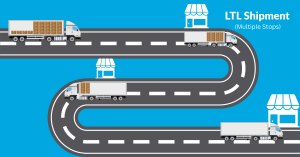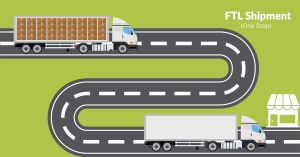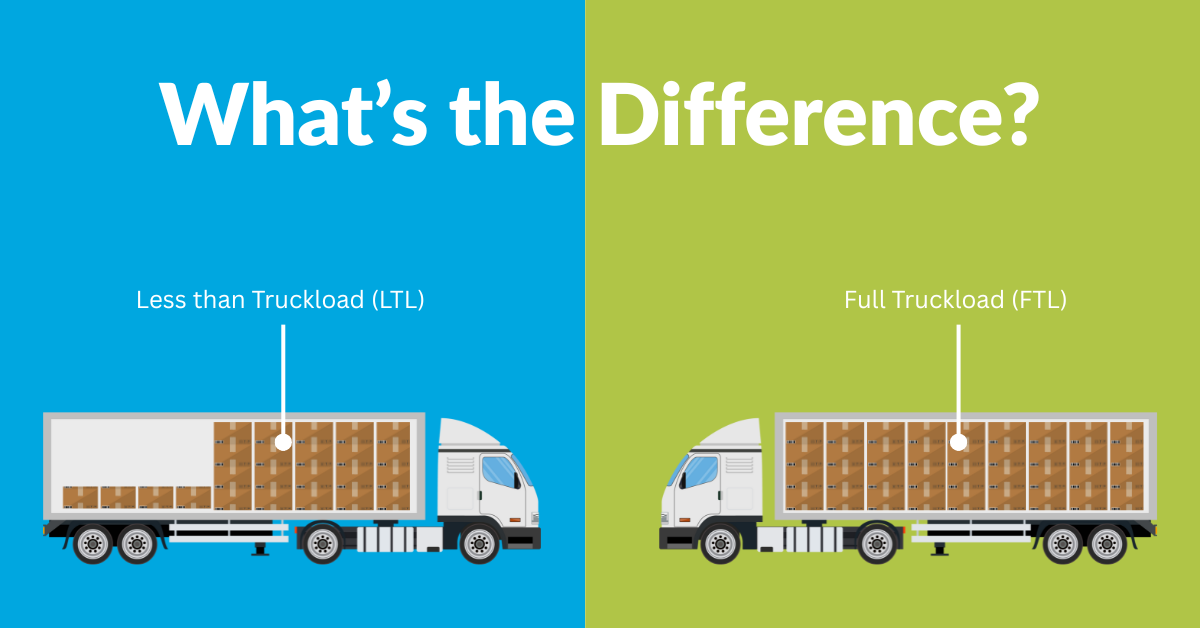Confused between LTL and FTL shipping? Learn the crucial differences in cost, speed, cargo size, handling, and more to choose the best option for your freight with FlagShip’s expert guidance.
Navigating freight shipping can be complex, and one of the most common decisions shippers’ faces is choosing between Less-Than-Truckload and Full-Truckload services, otherwise known as LTL and FTL shipping. While both move goods by road, understanding their fundamental differences is crucial for optimizing cost, speed, and efficiency.
This blog from FlagShip breaks down the key distinctions between LTL and FTL shipping to help you make the best choice for your unique shipping needs.
At FlagShip, no shipment is too big or too small. Our Logistics Freight Division offers comprehensive services to customers who need to move large shipments, whether you’re shipping within Canada or cross-border.
Don’t have an account? It’s easy and free to sign up!
Simply click here to get started
Understanding LTL and FTL Shipping
Less Than Truckload (LTL) means a shipment that does not require a full trailer. Your freight shares truck space with other shippers’ making it cost-effective for smaller loads. LTL can utilize vans, flatbeds, or other specialized trucks depending on your specific needs.
Full Truckload (FTL) means your shipment fills an entire 48′ or 53′ trailer. FTL shipments can require straight trucks, 48’/53′ vans, or specialized equipment, depending on the needs of the goods being shipped. Your shipment gets dedicated truck space and travels directly from origin to destination.
Key Differences Between LTL and FTL Shipping
| Criteria | LTL (Less Than Truckload) |
FTL (Full Truckload) |
| Shipment Size | • 1–6 pallets • Up to 15,000 lbs • Less than 12–14 linear feet • Small to medium shipments |
• 6+ pallets • Over 15,000 lbs • Full trailer capacity • Large volume shipments |
| Cost Structure | • Pay only for space used • Cost-effective for smaller loads • Shared transportation costs • Pricing varies by weight, dimensions, and zone |
• Higher upfront cost • More economical per unit for large volumes • Dedicated truck pricing • Predictable lane-based rates |
| Transit Time
|
• Slower delivery • Multiple stops and pickups • Hub-and-spoke routing • Less predictable windows |
• Faster delivery • Direct point-to-point routing • Dedicated truck/crew • More predictable timing |
| Handling & Security
|
• Multiple handling points • Higher risk of damage/loss • Loaded/unloaded at terminals • Suitable for durable goods |
• Minimal handling • Lower damage risk • More secure environment • Ideal for fragile/high-value items |
| Control & Flexibility | • Less route/schedule control • Flexible for irregular shipments • Subject to consolidation • Variable distribution impact/cost |
• More complete routing control • Dedicated capacity • Fewer carrier interactions • Customizable service options |
| Best For | • Small businesses • Irregular shipment needs • Cost-conscious approach • Non-urgent deliveries |
• Large shipments • Time-sensitive cargo • Specialized handling needs • High-value/fragile goods |
When to Choose LTL Shipping

Choose Less Than Truckload shipping when:
- You have small to medium-sized shipments (under 15,000 lbs.)
- Cost-saving is a priority over speed
- Your shipment is not time-sensitive
- Goods are durable and can withstand multiple handling points
- You ship irregularly or have varying shipment sizes
- You want to share transportation costs with other shippers
When to Choose FTL Shipping

Choose Full Truckload shipping when:
- You have large volumes of freight that fill a truck
- Time-sensitive or urgent deliveries are required
- You’re shipping fragile, high-value, or hazardous materials requiring minimal handling
- You need direct routing or specialized equipment
- Cost per unit is lower for your large shipments
Need help choosing the right freight solution?
Reach out to us at dispatch@flagshipcompany.com.
Making the Right Choice for Your Business
The decision between LTL and FTL shipping ultimately depends on your specific needs, budget, and timeline. Consider factors like shipment size, urgency, handling requirements, and cost sensitivity when making your choice.
At FlagShip, our experienced team understands that every shipment is unique. We work with you to determine whether LTL or FTL shipping best serves your needs, ensuring reliable delivery for your palletized shipments intra-city, cross-Canada, and cross-border to and from the USA.
If you feel that your shipments are restrictive in size and weight, or that the volume of your shipments is resulting in extra charges, our Logistics Freight Division might be the perfect solution for you. With our extensive carrier network and freight expertise, we’ll help you optimize your shipping strategy for maximum efficiency and cost savings.
Get Your Freight Quote Today
Ready to ship smarter? Whether you need LTL and FTL shipping, or international shipping solutions, FlagShip has you covered. Our team of freight experts will help you choose the right service for your needs and budget.
For more information and quotes on our LTL and FTL shipping services, and other trucking solutions, contact one of our customer service representatives at 1-866-320-8383 or email us at dispatch@flagshipcompany.com.
Stay connected with us for expert shipping tips, updates, and support:
Follow us on Instagram
Like us on Facebook
Connect with us on LinkedIn

